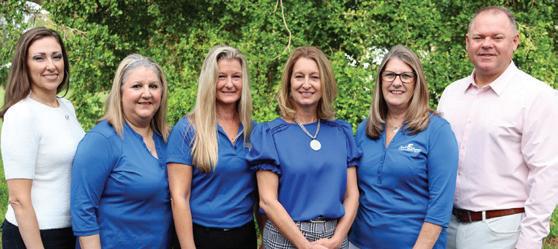


































Are you taking full advantage of estate and gift tax exemptions?
Commerce Trust, working in conjunction with your estate planning attorney, can guide you through the in-depth conversations required to assess how the use of tax exemptions could most effectively be incorporated into your estate plan.
The holistic, team-based approach at Commerce Trust, consisting of financial and tax planning, investment portfolio management, and trust administration, is designed to guide you toward achieving your family’s goals while safeguarding your legacy.
The current federal lifetime estate and gift tax exemption amounts, absent further legislative action, are scheduled to expire at the end of 2025.
Connect with the Commerce Trust team in Naples at commercetrustcompany.com/estatetax or contact us directly at (239) 383-6420






By ELIZABETH P. HUGHES, CPA, CFP ®, Financial Planning Manager, Commerce Trust
Deciding when and how to bring family members together to share your vision for how your wealth will be distributed is a very personal, and often difficult, decision. Consider the following suggestions for when and how to bring the next generation of your family together to learn about your estate plan and longterm goals for your wealth.
Every family is unique so one type of family meeting may fit better than another. Consider involving a wealth management professional who can help identify which approach is right for your family. Or ask a member of your wealth management team to serve as an independent third party to mediate the conversation.
Family Councils: Some families create a family council consisting of family members from each generation.
Family Foundations: Others view family meetings as a time to involve loved ones in their family’s private foundation. For many families, it is important for younger generations to get involved earlier rather than later in life.
Family Business Meetings: For family members who are not working for the family business, attending a family business meeting is a way to involve them in the business in a way that will not impact daily operations.
Next-Generation Education: Sometimes, next-generation meetings can be more focused on wealth preservation and financial education.
Finally, it is common to arrange family meetings to bring loved ones together. Creating a space in which each generation feels able to communicate how they are feeling and that the rest of the family is listening to them sets a positive tone for these conversations.
Here are a few ideas to consider:
• Sometimes it can be beneficial to separate into groups and let family members who are part of the next generation meet as one group.
• You might choose to invite an independent third party (outside the family) to participate in these meetings and help facilitate conversation.
• Plan a meeting at a location away from where family members live. This allows for more family time outside of the meeting if everyone is staying at the same location.

Commerce Trust offers a team-based holistic approach to estate planning that includes facilitating various types of family gatherings. Allowing your Commerce Trust wealth management team to act as a third party in family meetings could allow for a balanced and objective approach to difficult subjects.
Contact Commerce Trust today at www.commercetrustcompany.com/estateplanning to learn more about how we can help you navigate family estate planning conversations so all family members are appropriately included.
The opinions and other information in the commentary are provided as of April 25, 2024. This summary is intended to provide general information only, and may be of value to the reader and audience.
This material is not a recommendation of any particular investment or insurance strategy, is not based on any particular financial situation or need, and is not intended to replace the advice of a qualified tax advisor or investment professional. While Commerce may provide information or express opinions from time to time, such information or opinions are subject to change, are not offered as professional tax, insurance or legal advice, and may not be relied on as such.
Data contained herein from third-party providers is obtained from what are considered reliable sources. However, its accuracy, completeness or reliability cannot be guaranteed.
Commerce Trust is a division of Commerce Bank.
Investment Products: Not FDIC Insured | May Lose Value | No Bank Guarantee









FEBRUARY 25

Totaling the major transactions shaping the local landscape
Southwest Florida celebrates 100 years of hosting MLB spring training

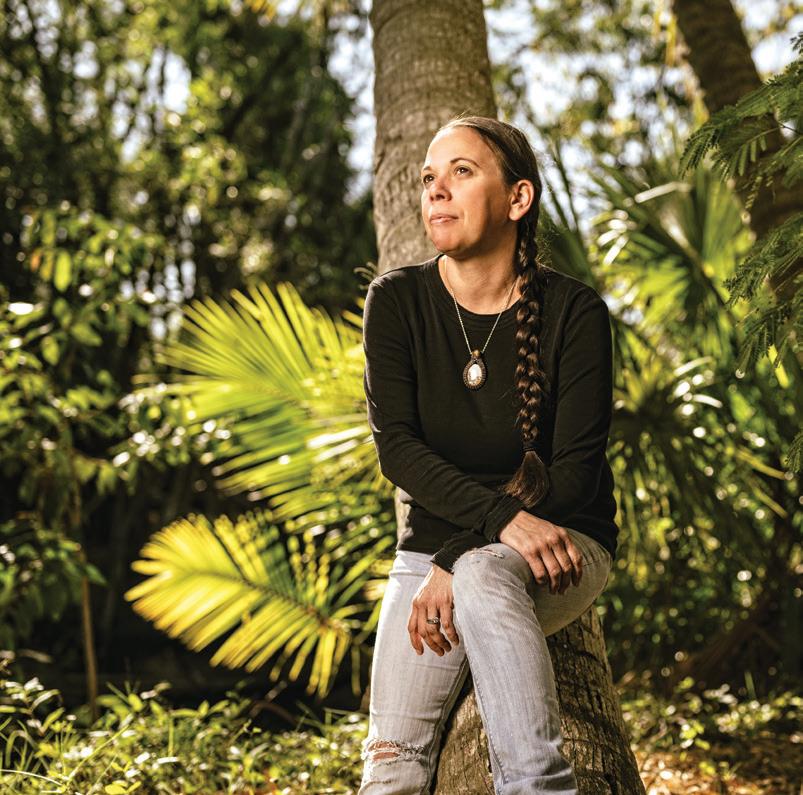
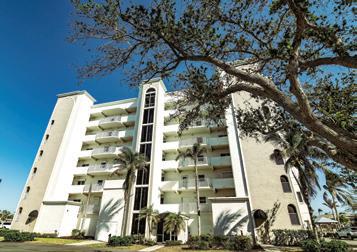





PUBLISHER Carin Keane
PRESIDENT Jim Schwartzel
EDITOR IN CHIEF
Heidi Rambo Centrella
Digital Editor Adam Regan
Associate Editor Kaitlin Regan
Senior Editors Tim Aten, David Dorsey, Therese McDevitt, Nancy Semon
Copy Editor Steve Gill
CONTRIBUTORS
Artis Henderson, Justin Paprocki, James Raia
ART Creative Directors
Scott Glick, Jerry Pomales
Photo Editor
Mary Rich
ADVERTISING
Associate Publisher Chris Renstrom
CIRCULATION
Director of Audience Development Kerri Nolan
PRODUCTION
Production Manager Martha Leavitt
ADMINISTRATION
Advertising Services Manager, Subscriptions & Distribution
Kathleen Hill
Office Address
26101 S. Tamiami Trail, Bonita Springs, FL 34134
Call or text 239.498.8500
gulfshorebusiness.com info@gulfshorebusiness.com
Subscriptions
Southwest Florida residents can subscribe for free online at gulfshorebusiness.com, out-of-area residents can subscribe for $12 a year, call or text 239.498.8500 for more information.
Change of address
Send old and new addresses and a mailing label, if possible, to Gulfshore Life, 26101 S. Tamiami Trail, Bonita Springs, FL 34134. Visit gulfshorebusiness.com/subscribe to login and update your address, call or text 239.498.8500 or email subscriptions@gulfshorebusiness.com.
Back issues
A limited number of back issues are available for $4.95 each plus tax and postage. Visit gulfshorebusiness.com/backissues.
Reprints
Visit gulfshorebusiness.com/reprints for plaques and reprints.
Contact Us
Please send all correspondence to: Gulfshore Business 26101 S. Tamiami Trail, Bonita Springs, FL 34134 Call or text 239.498.8500
WEBSITE
gulfshorebusiness.com


One of my many jobs as a reporter — many years ago — was covering commercial real estate. I was one of those numbers enthusiasts who liked talking square footage and inside baseball with brokers and developers. It’s not for everyone, but it especially appealed to me and I enjoyed it much more than other beats I covered, which is likely why I look forward to this issue each year.
David Dorsey tracks and tallies Southwest Florida’s real estate transactions throughout the year until the clock strikes midnight on Dec. 31. He follows the money and the trends, and compiles it all in a nice package we present each February in Top Deals (page 28).
It’s an adage in the industry that retail follows rooftops, and our area’s ongoing population growth naturally meant more and greater opportunities for expanding businesses. A marked trend we saw this year was that the continued strength of online retail still has some local effects, in the form of an increased emphasis

on infrastructure such as warehouses and distribution centers. Read on for details on some of the biggest moves — including what we believe to be the most lucrative transaction to date in the history of Southwest Florida.
Another story related to a new state law going into effect may be especially concerning to condo owners, or perhaps those looking to own a condo in the Sunshine State. The Condo Rights Bill, HB 1021, was written after Champlain Towers South in Surfside (on the east coast) partially collapsed in June 2021. The new law requires condos of four or more stories to have milestone inspections and a host of other requirements, all affecting condo build-
ings approaching 30 years in age, and ultimately at a price that is handed down to owners. Safety is an obvious necessity, but the legislation means residents are looking at spiking association fees, and longtime owners of older buildings may be in for a painful financial squeeze. David Dorsey explores the implications in “The Cost of Condo Living” on page 22.
A beat I never was asked to cover — and for good reason — is sports. I can talk a little about most any topic … but sports is not among them. Thankfully, I’ve got former sports reporters on my team who do understand the rules, the stats, the names and the inner workings.
David Dorsey pulls triple duty this issue by looking back at the past 100 years our region has embraced Spring Training. Multiple Major League Baseball teams get started on the season to come by warming up beneath our sunny skies — an arrangement that didn’t happen by accident, and which has provided a century of economic benefits for Southwest Florida. Enjoy our look back, and forward, in “Diamond Anniversary” on page 36.
HEIDI RAMBO CENTRELLA EDITOR IN CHIEF

By Justin Paprocki
Cape Coral City Manager Michael Ilczyszyn appointed Ryan Lamb as the city’s first director of the Emergency Management and Resilience Department. In his new role, Lamb will oversee the city’s emergency management program, enhancing disaster readiness and community resilience. He also will lead initiatives to strengthen the city’s resilience against future challenges and guide the community through proactive disaster preparation and recovery efforts, city officials said. Lamb began his career as a volunteer firefighter during Hurricane Charley in 2004 and joined the Cape Coral Fire Department in 2005, eventually serving as fire chief/emergency management director.
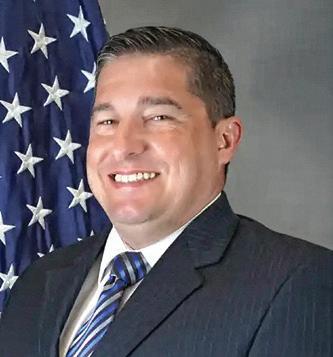

“We recognized that we want to invest in people, and people want to be invested in. They don’t want to just be in the same role for the rest of their lives; they want the opportunity to grow, and we try to encourage that.”
— Brandon Box, president of Cogent Bank’s Southwest Florida market

Can it be five years already since the word pandemic became part of the everyday American vernacular? Yes. Yes, it can. Next month, Therese McDevitt examines how Southwest Florida businesses have recovered since COVID-19 was first introduced … and how to better prepare for a potential next time.

Florida gained a net total of 126,000 residents from other states in 2023, representing a nearly 50% decrease from the previous year and the first major decline in net migration in a decade, according to data from Florida Chamber Foundation’s latest State-toState Population Migration Report. The report attributes this shift to rising housing costs and perceived limited career opportunities for younger, early-career workers. The report states Florida led the nation with a net income migration of nearly $36.1 billion annually, more than three times the second-ranked Texas, though it experienced resident outflow to 19 states in 2023. While Florida saw an influx of residents aged 60 and older, younger residents — particularly those aged 20-29 — left in significant numbers.

Naples neuro-spine surgeon Dr. Mark Frenkel is patenting a new method for spinal fusion surgery that may one day become the standard treatment. Spinal fusion links vertebrae together to stop movement and pain. The procedure evolved to make use of small tools and incisions, but still requires a large cut in the back to place rods and screws that hold things together until the bones fuse. With the backing of Physicians Regional Medical Center, Frenkel is patenting a new approach that fuses the spine without rods and screws. Instead, he curves tiny needles through the bone and spacer into the other bone before injecting cement approved for use in the spine to reinforce fractures.
The Cape Coral-Fort Myers housing market was ranked 16th on the realtor.com’s Top Housing Markets for 2025, showcasing areas that are forecasted to be primed and ready for growth. The open real estate marketplace’s model-based forecast used data on the housing market and overall economy to estimate 2025 values for variables for the 100 largest U.S. metropolitan statistical areas by population size. These markets were ranked by combined forecasted growth in home prices and sales. The Cape Coral-Fort Myers combined 2025 existing home sales and price growth is projected to be 22.8%, ranking just behind Jacksonville (23.3%).


Gov. Ron DeSantis announced that $578 million from the Moving Florida Forward Initiative is dedicated to congestion relief on Interstate 75 from Golden Gate Parkway in Collier County to Corkscrew Road in Lee County. The project will widen 18.5 miles of I-75 and add one lane in each direction and auxiliary lanes, increasing the roadway by six to eight lanes. DeSantis said the project will begin construction in 2026 and is expected to be completed 10 years ahead of schedule. Florida Department of Transportation officials said it will reduce travel times by an estimated 47%, increasing traffic operations efficiency and enhancing the safety and quality of life for communities in Southwest Florida.
Naples Airport served about 200,000 passengers in 2024, and the Florida Department of Transportation estimates a $781 million economic impact, according to data from Naples Airport Authority’s 2024 Annual Report. The airport, which receives no local tax dollars, had a $62 million operating and capital budget and supported 5,454 jobs. It supported 123,171 aircraft operations, including 221 single-engine, 36 multiengine, 85 jets and 18 helicopters, in 2024.
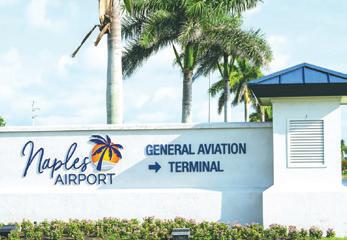
After 74 years, city of Naples stopped fluoridating public water on or before Jan. 1, after repeated public demand to protect residents’ health, especially children and the elderly. The city had been adding 0.7 mg of fluoride to city water since 1950 after a mandate by the state Board of Health, but fluoridation has been controversial for decades. In February 2024, the Board of Collier County Commissioners stopped fluoridating water after 39 years, saving the county $126,000. The cities of Marco Island and Everglades do not fluoridate.

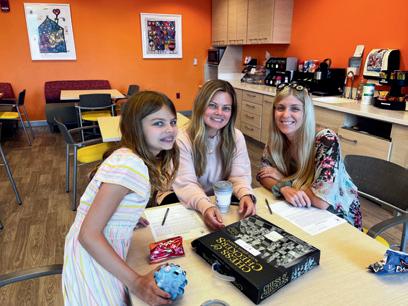


Next time you visit a local McDonald’s restaurant, ask to Round-Up for RMHC! Your donation directly contributes to supporting families with ill and injured children.
When you place your order at McDonald’s—whether at the kiosk, front counter, or drive-through—you can make a big difference with just a small gesture. Simply select the “Round-Up for RMHC” option at checkout, or let the cashier know you'd like to round up your purchase. By rounding up, you’re helping relieve the stress and financial burdens of families in Southwest Florida, allowing them to focus on what truly matters: being with their children during challenging times.
Learn more at rmhcswfl.org or scan the QR code below.

NextGen series speakers tell business like it is
By Therese McDevitt
When the exclusive 2025 NextGen speaker series kicks off in Naples this month, the next generation of young professionals invited to attend can look forward to being inspired, motivated and challenged by the trio of business leaders who will be sharing stories of their successes and failures this season.
Started in 2013 by Michael Benson, CEO of Naples-based financial services firm Benson Blackburn, the invitation-only series of speaking events — think of it as Naples’ version of TED Talks — features luminaries from a wide variety of arenas covering leadership, mentorship, empowerment, philanthropy and similar topics.
The 2025 series features New York Times bestselling author, entrepreneur and executive coach Joe Sweeney in February; former U.S. Congressman for Florida and Chairman of Rooney Holdings Francis Rooney in March; and former Cargill Inc. CEO and executive board chair David MacLennan in April.
Invitees include Southwest Florida professionals, along with educators and students from area colleges and universities, all of whom have the op-

Joe Sweeney
Author, entrepreneur and executive coach

professionals from a wide variety of industries covering leadership, mentorship, empowerment, philanthropy and more. The series kicks off in February with New York Times bestselling author, entrepreneur and executive coach Joe Sweeney.
portunity to mix and mingle with the guest speaker and fellow attendees.
The speakers are candid about not just their successes, but their lessthan-stellar moments and “career, business and life disruptions.” Benson has previously said that he wants NextGen speakers to share their life stories “from where they were at age 20 to how they got where they are today. We want to hear their successes, their failures, what they’ve learned.”
Each event starts with a networking opportunity and always concludes in a Q&A session with that month’s speaker facilitated by Benson, a skillful host and interviewer who keeps things moving briskly. Previous speakers have included Ginni Rometty, former CEO of IBM; Jan Fields, former president of McDonald’s USA; Richard M. Schulze, founder and former chairman and CEO of Best Buy; Ralph Stayer, former CEO of Johnsonville


Sausage; Michael Duke, retired president and CEO of Walmart Stores Inc.; Jerri and David Hoffmann, founders of Hoffmann Family of Companies; and Shelley Broader, former president and CEO of Chico’s FAS Inc.
Speaking of networking, high-powered executive coach Sweeney, who kicks off the 2025 series, sees it as “a contact sport” and said it’s really about the power of connection and building deeper relationships.
His first New York Times bestselling book, in fact, put that concept right in
Networking is really about connection, and I think this is the most important topic all of us can deal with: the power of connection and the value of human relationships.”
Michael Benson Benson Blackburn CEO
the title: Networking Is a Contact Sport: How Staying Connected and Serving Others Will Help You Grow Your Business, Expand Your Influence — or Even Land Your Next Job. Sweeney is also a serial entrepreneur, author, speaker, professional board member and active private equity investor who said he has used the fields of sports, business, the military and the government as his “laboratory” for the study of human behavior, and how to build those connections that lead to success.
“Networking is really about connection, and I think this is the most important topic all of us can deal with: the power of connection and the value of human relationships,” Sweeney says.
He said his executive coaching “is really based on studying human behavior for 45 years” because of his fascination with “what makes people tick.”
“I think it’s made me delve into why some people outperform others,” he says, “and in business, understanding why people buy your product, why people buy a company, why people sell a company.”
Sweeney says his NextGen talk will include his take on “the number-one success tool in business” and on the importance of true connection, especially in the age of smart phones and social media.
The NextGen series has a built-in philanthropic aspect, as well: At each event, an area nonprofit receives a $5,000 grant in honor of the guest speaker. Previous grant recipients include the David Lawrence Centers; The Shelter for Abused Women and Children; the Immokalee Foundation; American Cancer Society; Naples Comprehensive Health; Naples Children and Education Foundation; and Leadership Collier Foundation.
Those wishing to be considered for an invitation can request tickets at nextgennaples.com and follow up with the organizers to see if they have qualified for access. It’s an application worth making if you’re interested in lessons from some of the best leaders in business, right here in Southwest Florida.
Teresa Chorba’s ornamental hobby
By Justin Paprocki
Teresa Chorba never really thought of herself as an artistic person. But not too long ago she started experimenting with metal wire, wrapping it around gemstones to create unique patterns and shapes.
Today, she runs Wrapped in Stone FL and creates pendants, bracelets and other jewelry. The West Palm Beach native moved to Bonita Springs about 20 years ago. Her whole career has been in the food and beverage industry, but a couple of years ago she decided to find a hobby. “This is something I could do for myself,” she says. “Working in [food and beverage], you get used to doing everything for others.”
Chorba had come across a few YouTube instructional videos and dove right into buying the wire and experimenting with bracelets. She started incorporating gemstones, at times traveling to gem shows around the state to replenish her stock. It takes a little time to learn the intricacies of the art — such as the differences in the malleability between copper and silver wire, for example. But soon she had a small collection of jewelry. And then she started to make a few as gifts. “I had run out of friends and family to ask to buy something from me,” she says with a



While




sells her jewelry at local farmers markets, but hopes to expand her selling operations someday.




laugh. “But I still had so much more.”
She started to get into the local farmers market circuit, and now has a booth weekly at the Coconut Point Farmers Market Thursday mornings at Coconut Point Mall. She sells mostly in person but posts frequently on her Facebook and Instagram (@ Wrapped_In_Stone_FL) to stay in touch with her customers. She still works full time as a server, so she’s limited in what she can sell. Chorba hopes someday she can expand her selling operations, but in the meantime, it still remains that hobby she can look forward to doing after a long day of work. “It’s not a big money-maker,” she says. “I do it because it’s fun. It’s a great creative outlet.”
By Justin Paprocki
Florida homeowners, we feel your pain.
The cost of homeowners insurance in the state is the second highest in the nation, according to Bankrate. The average premium of a policy with $300,000 in dwelling coverage is about $5,527 in Florida. That’s more than double the national average of $2,304.
Severe weather has continued to drive rising rates across the country. Midwestern states also tend to rank highly due to the potential of tornadoes causing widespread damage. If you’re looking to escape high rates, look north: Vermont, New Hampshire and Delaware had the lowest premiums in the nation (all less than $1,000 annually). Insurance rates still high and rising


Are our local governments learning from the Ian experience?
By Shelton Weeks
We are now well past the two-year mark of Hurricane Ian’s landfall in Southwest Florida, and many residents are still struggling with the recovery process. This is not a surprise given the magnitude of the storm’s effect. However, it is very important that we learn from the experience so that our community is rebuilt in a manner that is more resilient in the face of future storms.
Based on the observed performance of structures built to the current code, I am confident that the buildings that replace the ones destroyed by Ian will fare much better than their predecessors. The current codes and techniques taught in construction courses such as those offered by Florida Gulf Coast University’s Stock Development Department of Construction Management are having a profound influence on the resiliency of the built environment in coastal areas.
While the disaster response from state government may not be perfect, it seems that Florida is definitely riding the learning

curve and making progress in terms of the efficiency of relief efforts. For me, the more concerning issues are at the local level, where officials and various government employees oversee rebuilding efforts in the wake of severe weather events.
As the months have rolled by since Ian devastated Fort Myers Beach, Sanibel and other coastal communities, we have all seen stories in the news about the challenges faced by businesses and homeowners as they try to rebuild. Beyond the typical issues faced in any rebuilding process, many of these stories include an element that I don’t think gets enough
attention. No, I am not thinking about the daunting cost to rebuild to current code, problems in securing materials or staffing challenges in our tight labor market. The element that jumps out to me is the cost associated with delays in the permitting and approval process. If you ask anyone in real estate development or construction, they will tell you that permitting and approval tends to be an arduous task. It is this way for a variety of reasons, among the most important of which is the fact that the use of real property has the potential to impose negative externalities on neighboring properties and their owners. The permitting and approval process serves to minimize these damages.
However, when the system is overwhelmed by an event of Ian’s scale, lengthy delays are likely to occur. These delays impose tremendous costs on property owners — many of whom face significant carrying costs for properties they can neither use nor repair. For some individuals and businesses, this is an aftereffect of the storm


While trying to rebuild after a severe weather event, such as Hurricane Ian, there are many challenges, including the cost to rebuild to current code and problems in securing materials or staffing challenges. But delays in the permitting and approval process can be fatal for businesses and homeowners stuck in a holding pattern to rebuild.
they are not able to weather. In this situation, homeowners burn through savings and businesses quickly consume capital trying to stay afloat until they are allowed to rebuild. Ultimately, some will not be able to hold out and will be forced to exit the market.
It is not surprising that our local governments were overwhelmed by Ian. Devastation of this scale is dif-
ficult to comprehend and not easily addressed in a contingency plan. However, in the slice of paradise that we call home, the risk of severe weather events is not going away and will likely increase if sea levels rise as predicted. Therefore, municipal disaster response plans need to include a process for expediting the permitting and approval process during reconstruc-
tion. Inclusion of such provisions will increase the resiliency of our community by allowing property owners to rebuild in a timely manner.
— Shelton Weeks is the Lucas Professor of Real Estate and director of the Lucas Institute for Real Estate Development & Finance at Florida Gulf Coast University’s Lutgert College of Business.
New Florida law governs oversight, brings financial bite
By David Dorsey
A new law has transformed the condominium market in Florida, forcing owners to change their financial plans. The laws have been prompting many owners to sell their condos now, because the bills have come due and they cannot afford to pay them.
The Condo Rights Bill already has taken on a trio of nicknames. House Bill 1021, passed in 2021 unanimously by the state’s House of Representatives and Senate, is also known as the “DeSantis Condo Law,” “Condo 3.0” and the “New Condo Law.”
Written after 98 people died when the 12-story Champlain Towers South condo in Surfside on the east coast partially collapsed in June 2021, the new law requires condos of four or more stories to have milestone inspections. It also requires condo associations to have structural integrity reserve studies, elect leadership, keep records, maintain financial literacy and transparency, levy fines and issue notice and meeting requirements.
All of that costs money. And all of that is affecting the market for aging condo buildings that were built prior to 1996 or are approaching 30 years in age.
Stan Stouder, a commercial real estate broker, doesn’t sell con-
dos. But he lives in one, Mastique, which has views of the Gulf of Mexico and Estero Bay. He does not like the unintended consequences of the new laws.
In 2022, Mastique fourth-quarter association fees cost $2,625. In 2024, those fees rose to $3,800, a 45% increase in two years. Stouder noted a lot of those fee increases were because of insurance increases; complying with the new laws could cause further increases.
“I think you have unanimity in the vote because of the Surfside disaster,” Stouder says. “I think the intentions are good, but the implications are never known until the law is applied. I think the implications need to be adjusted to reality. There’s got to be hundreds or thousands, if not millions, of condos in Florida.”
The owners of those buildings should not be financially punished, Stouder said, because of the Surfside disaster.
“There were glaring structural deficiencies in the Surfside example,” he says. “Visible, sizable cracks that would give anybody with common sense cause for concern. To apply that same, super hyperbolic engineering scrutiny on properties that are 30 years old on


Stan Stouder
Commercial real estate broker

The Condo Rights Bill, written after Champlain Towers South condo in Surfside partially collapsed in June 2021, has unintended consequences, including rising association fees to keep up with insurance increases.
the coast, seems to be something that could have been modulated. To paint the entire product type with the same brush is an overreach. It’s doing a lot more damage than I think the elected officials intended. I don’t think they intended to put anybody in economic jail. And that’s what this is: It’s economic jail.”
In Naples, condo sales in 2024 were down all year long from 2023. Sales plummeted by larger margins even after interest rates finally began to fall.
In August 2024, 241 Naples area condo units were sold, which was down 28.5% from 2023. The average price fell, as well, from $485,000 to $479,000, a drop of 1.2%, according to statistics tracked by NABOR, the Naples Area Board of Realtors.
In September 2024, 250 Naples area condos were sold, which was 20.6% down from 2023. The average price continued to drop, from $470,000 to $450,000, a drop of 4.3%.
“Over here, take the Naples Continental Club,” says Joe Belz, a real estate agent with Compass in Naples. “That’s a project that’s still not open from [Hurricane] Ian. They’ve had huge assessments, and there’s a lot of people in that building who can’t afford those assessments. They need to reach a point where they can sell in order to pay the assessments.”
Doug Grant, a real estate agent with the Grant Group in Naples, said he has heard of $1 million units selling for $850,000, because condo supply is exceeding demand.
“Certainly some of these older owners, they’re going to have to sell, because they’re on a fixed income,” Grant says.
Chris Loffreno, a Fort Myers Beachbased real estate agent with Loffreno Real Estate Inc., said he doubted some condo associations would be able to afford complying with the new law.

The new law requires condos of four or more stories to have milestone inspections. It also requires condo associations to have structural integrity reserve studies, elect leadership, keep records, maintain financial literacy and transparency, levy fines and issue notice and meeting requirements.
“It’s a different market,” Loffreno says of Fort Myers Beach. “We’ve also been through three hurricanes here. The law is for everybody’s safety, but it can be very costly. I don’t think they thought about the cost factor and how it will impact people who are on fixed incomes. They’re on life support right now, these condos. The market is really slow right now. I expect it to pick up at some point, because it is the beach.
“It’s hard. It’s a difficult thing. But things will get better. We’ll have new structures built to code. It will be
more of an upscale community.”
Riviera Club measures 12 stories and has 81 units, many of which overlook the beach and the Gulf of Mexico. Terry Hilgenberg, treasurer of the homeowners association, said the condo’s clubhouse has yet to be built two years after Hurricane Ian.
“It wiped out our clubhouse,” he says. “Completely. We’re still waiting for the permitting process. But we are grappling with the issue of ‘If we build the same thing, are you going to have the same experience (with the next storm)?’
My recommendation to investors is you want to do your pricing off of 2019,” Zalewski says. “You want to eliminate everything we experienced during the pandemic. Use that (2019) for your real pricing. Because anything after that — 2020 everything fell, and 2021 everything spiked. I would tell you 2019 would be more reflective of its true value.”
Peter Zalewski knows a thing or two about the Florida condominium market; since the mid-1990s, he has been brokering them.
Velocity on sales in the Tri-County area of Miami, Broward and Palm Beach counties — where he is based and where there are about 610,000 condo units — was as low in 2024 as it has been since the Great Recession. Zalewski shared a timeline of Florida condo trends and his outlook for the future.
Mid-1990s: Florida high-rise condominium market emerged.
2005: Peak of activity. Also the year Hurricane Wilma traveled across South Florida, stalling the market.
2006: Peak of pricing.
2007-10: Great Recession put many condo units into foreclosure.
2011: Condo market began to recover, and construction projects

started again. Land prices fell, but banks required 50% financing before construction instead of 20% financing.
2016: Market began peaking again. “We had maximum development going on,” Zalewski says.
2018: Interest rates rose, housing supply went down
2020: COVID-19 pandemic spread. “No transactions; we’re all going to die,” he says. “Everything freefalls.”
2021: Newcomers flooded Florida. Condo market went into overdrive. “Everybody comes from the northeast,” Zalewski says. “They come from the West Coast. The spike in velocity — number of sales quadrupled. There was just this tremendous surge.”
2024: The condo surge ended.
“I think what’s going on is, there was a lot of confusion in 2024 about what the new laws would mean,” Zalewski says. “There wasn’t a great understanding of it. An old product would come on the market and might seem like a great deal. Uninformed buyers would come and buy it because they wanted a piece of Florida. Now, they’re realizing they were suckered. When times are great, you’ve got 300 people outside for the open
house, and you get 80 offers. You don’t have the same gullible buyer today because of the amount of attention that’s come recently.”
Where do we go from here?
The market has cooled, but Zalewski called it a “blip.” He said it’s temporary.
“I think where we go from here is Florida is probably going to be a very predictable place to invest in a condominium, simply because of transparency,” Zalewski says. “Transparency did not exist until up to this point. Is it a stable building? Is it a stable unit? That transparency is coming. Probably not until 2026 or 2027. Once all of that is done, it will be a very predictable space in which to invest.
“Up until then, it’s going to be chaos, because of the lack of information and because of the disinformation that’s out there.”
Zalewski said 2025 will be a great time to invest in a condo — for those with a higher risk tolerance.
“My recommendation to investors is you want to do your pricing off of 2019,” Zalewski says. “You want to eliminate everything we experienced during the pandemic. Use that (2019) for your real pricing. Because anything after that — 2020 everything fell, and 2021 everything spiked. I would tell you 2019 would be more reflective of its true value.”
“There are differences of opinion. We’ve got 81 different opinions.”
Condo owners effectively must either become financial planners or adhere to the advice set forth by them. They must budget — and likely raise — homeowners association fees and then allocate them to pay for the newly required inspections, and any necessary construction costs to fortify the buildings.
At Casa Marina on Fort Myers Beach, financial literacy already has been in place, said condo owner and association member Larry Bromme. But hurricanes Ian, Helene and Milton also have tested those finances over the past three years.
Casa Marina has three six-story buildings and one five-story building, combining for 92 owners. Each of them pays $2,400 per quarter in fees.
The new law could complicate a purchase, Bromme said, especially if those fees need to rise.
“When a person comes in and wants to buy a unit at Casa Marina, a person who doesn’t know anything about condos and doesn’t know anything about the funding,” Bromme says, “I can tell a prospective buyer: ‘We are fully funded. We have X amount of dollars in reserves.’ You should be asking: ‘How much do you have in reserves?’ Or do you buy the thing and get hit with a $50,000 fee?”
Matt Kuisle of Reserve Advisors, based in Milwaukee, Wisconsin, has an office in Sarasota. He does reserve studies for a living. He meets with various condo associations, examines their finances and advises them on how to proceed with the future in mind.
If repairs are needed, somebody such as Andy Schrader of Recon Response Engineering gets hired to fix the condos.
“It’s a physical and a financial analysis for 30-plus years,” Kuisle says of what Reserve Advisors does. “Capital repair needs and replacement costs so they can

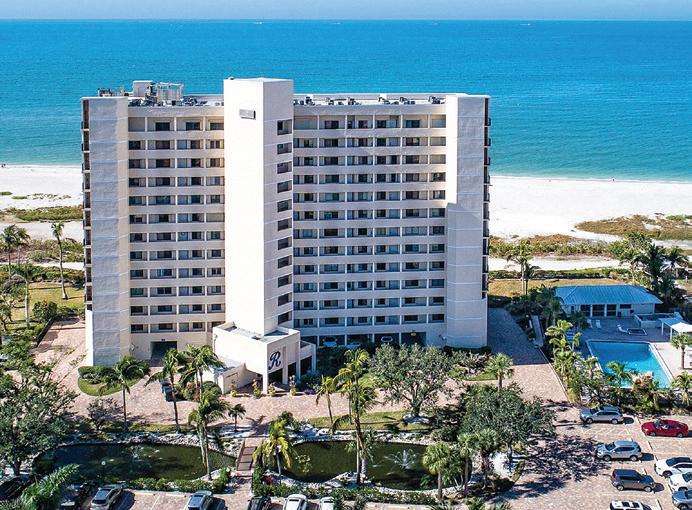
Chris Loffreno, a Fort Myers Beach-based real estate agent, believes some condo associations won’t be able to afford complying with the new law, especially with the expense of three hurricanes in three years.
budget adequately for those items as they come up. They can specially assess or try to get financing.”
Some condo associations, however, go another route: “The do-nothing option,” Kuisle calls it.
In the case of the Champlain Towers, the association did not have funding in place to make necessary repairs, he said. By the time it sought new funds, the building collapsed.
“It’s coming throughout the world, but especially in Florida,” Kuisle says of changes to condominiums. “A lot of them have themselves in a pretty bad financial position. We try to help them
ly what happened in a lot of cases.”
For condos that fail milestone inspections, hope is not lost, Kuisle said.
“There’s all types of strengthening,” he says. “We call it concrete restoration. We can cut out concrete and rusted steel. There’s absolutely work that can be done with those buildings. It’s expensive, but much less expensive than building a new building. The more diligent you are about it — before they become giant ‘root canals’ — the better off you are.”
Inspecting aging condos, Bromme said, reminded him of inspecting aging cars — or aging people making a
pany,” Bromme says. “In my opinion, it’s going to be a very, very expensive thing. Not necessarily because the condos are in bad or terrible condition. But if you go into a doctor, they’re going to find things wrong with you.”
Bromme said he planned on staying put on Fort Myers Beach. He has endured too many cold winters in Minnesota to go back for more. But he understands why others are leaving their condominiums behind in light of the new laws.
“If you went out today and looked at a car that’s, say, 10 years old and brought it to an expert, they’re pretty much obligated to find everything wrong with it that they can,” Bromme says. “I think it’s an overreaction.”


By David Dorsey

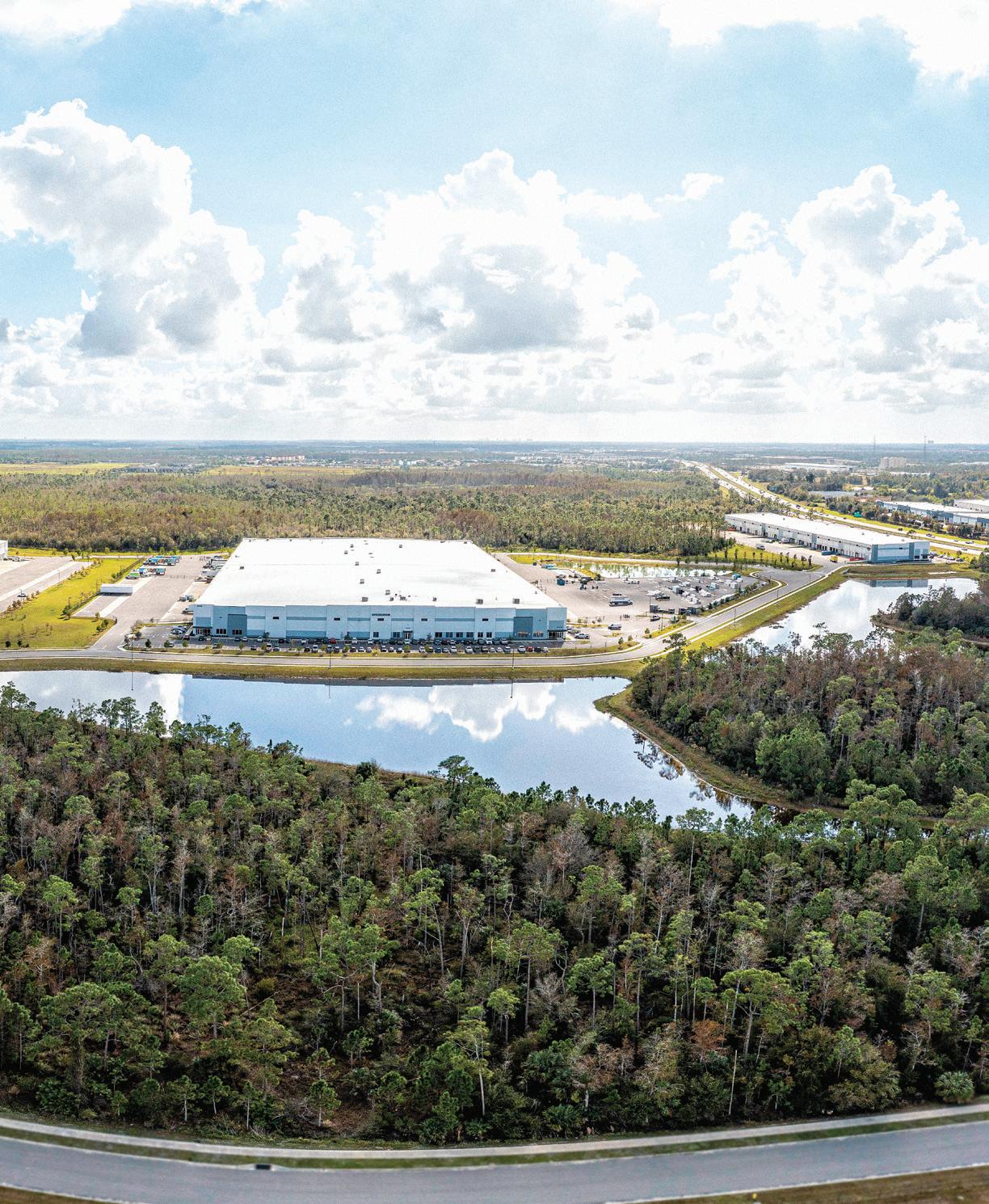
The rise of online retail and continued regional population growth played a large role in a series of yin/yang real estate transactions that defined Southwest Florida’s top deals of 2024.
Established shopping centers and industrial warehouse buildings stood out when looking at last year’s most lucrative deals. “Retail is obviously still really strong,” says Matt Simmons, a property appraiser for Maxwell, Hendry & Simmons. “People have predicted the death of retail so often. ‘Everybody’s shifting to online, and we’re never coming back.’ But the idea that everybody is going to be buying everything online — nope. That’s not going to happen.”
The arrival of the COVID-19 pandemic in 2020 accelerated online shopping trends in the U.S., boosting annual percentage revenue from about 10% in 2019 to about 16% in 2024, according to a study done by Capital One bank. That 16% figure sounds substantial, Simmons and other area real estate experts said. But because more than 80% of retail revenue still happens in person, it means shopping centers will continue to hold and increase in value.
Vacancies continue to fill, and the Bell Tower shops exemplifies those trends, with Nordstrom Rack replacing Bed Bath & Beyond last year. But it’s the Capital Grille concept just across the parking lot from Nordstrom that will become more of the new normal, said Chase Mayhugh, broker and owner of Mayhugh Commercial Advisors.
“A lot of the clothing and traditional retail you’re used to is going bye-bye,” Mayhugh says. “But if you look at the restaurant front, people are going out to eat. They want those different options. That’s going to continue to happen.”
Because vacancies are filling, large investors have swooped in to purchase retail centers in areas with high traffic counts, said Jim Shiebler, senior vice president of investments for CBRE. Benderson Development spent almost $100 million for two shopping centers at high-traffic locations this year. It paid $54.7 million in June for Carillon Place, a 250,000-squarefoot shopping center off Airport-Pulling Road in Collier County, then $40.35 million in September for Cypress Trace, a 280,000-square-foot shopping center in south Fort Myers. Just across U.S. 41 from there, at Market Square, two portions of that shopping center, anchored by Target, sold in May for a combined $23.4 million.

Carillon Place (top), a 250,000-square-foot shopping center in Collier County, sold in June for $54.7 million. College Plaza (bottom), a shopping center off College Parkway in south Fort Myers, sold in August for $14.6 million.



“They’re all on incredible corners,” says Shiebler, who brokered one of the deals himself. College Plaza shopping center off College Parkway in south Fort Myers sold in August for $14.6 million.
“When you look at migration levels and all the population growth, it’s multifaceted,” Shiebler says. “You have employers. You have out-of-state migration. You have the snowbirds. You have the tourists. The alternative to new development is purchasing a property and having it stabilize and increase its rent.”
InvenTrust Properties Corporation, based in Downers Grove, Illinois, did just that. On Nov. 26, the company paid $41.3 million to Farallon Capital Management for The Forum at Fort Myers. This 185,000-square-foot shopping center includes just about everything on the northeast corner of Interstate 75 and Colonial Boulevard, except for the Home Depot and Super Target. The shopping center at 9350 Dynasty Drive includes Buffalo Wild Wings restaurant and Ross Dress for Less among 25 tenants, mostly a mix of dining and retail.
Publix bought Gladiolus Gateway, paying $17.2 million for the shopping center it had been leasing off Gladiolus Drive and McGregor Boulevard in south Fort Myers. Grocery stores always will be in demand, as will places with things to do, Shiebler said.
“I would say similar to how there’s a renaissance of vinyl records, there’s also what we call experiential shopping where people like to sample things,” Shiebler says. “We like to touch and feel. We like to examine it and experience it before we purchase. That is definitely experiencing a resurgence.”
The expected continuation of online retail growth means more infrastructure, such as warehouse and distribution centers, will be needed in Southwest Florida. The largest regional real estate deals of 2024 reflect that.
“One thousand percent,” says Justin Thibaut, CEO of LSI Companies. He brokered a 143-acre land deal Nov. 18 in Fort Myers — Amazon paid $66.5 million for it and announced plans to build and open a 750,000-square-foot facility there by 2027.
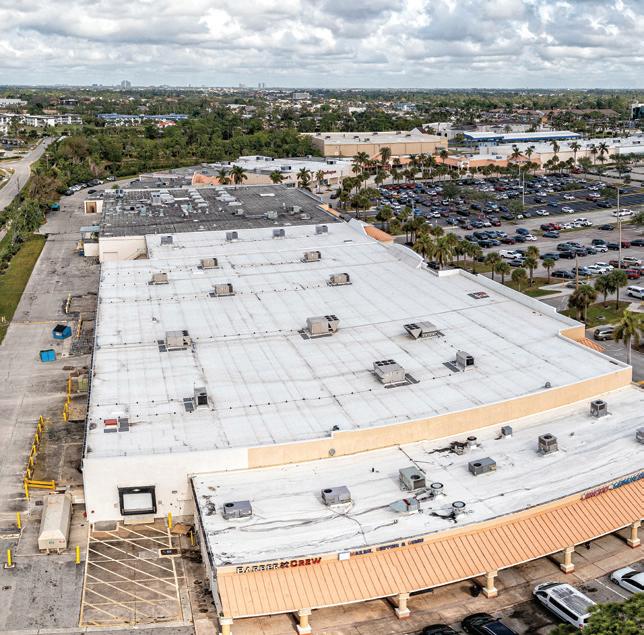

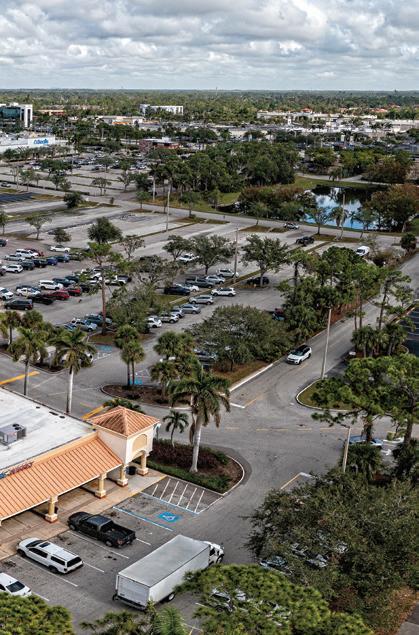

Cypress Trace (top), a 280,000-squarefoot shopping center in south Fort Myers, sold in September for $40.35 million. In March, CenterLinks Business Park (bottom), which includes nine buildings totaling 453,940 square feet, sold for $92.5 million.
“Our area was not comprised of large-scale distribution facilities until recent history,” Thibaut says. “The interesting thing is how fast our area is delivering that product. Take a look at the Alico Road corridor. Take a look at Treeline. Take a look at Luckett Road. The short answer is, we’re just catching up.”
Industrial deals far and away led the list of highpriced transactions. Deal after deal seemed to set records, as well. The Amazon deal set a record for highest-priced vacant land in Lee County history.
That record lasted a month, as Thibaut’s LSI Companies colleague Billy Rollins broke it again Dec. 12, brokering the largest vacant land deal in Lee County history once again, $100 million for 1,745 acres in northwest Cape Coral off Burnt Store. Up to 3,500 homes by D.R. Horton are being planned, plus commercial, medical and possibly even a small college. Construction on what will become the largest master-planned community in Cape Coral will commence this year.
A pair of warehouse deals also set records.
In March, Radnor, Pennsylvania-based EQT Exeter paid $92.5 million for CenterLinks Business Park, which has nine buildings combining for 453,940 square feet near Alico Road and I-75. That made for the largest industrial building transaction in Lee County history.
The record lasted less than eight months. In October, Tri-County 75, an 818,000-square-foot warehouse complex off Luckett Road in Fort Myers, sold for $155.1 million. Chicago-based Walton Street Capital made the purchase.
New York investment company GTJ REIT paying $33 million Dec. 23 for a 106,000-square-foot Frito Lay distribution center off Oriole Road in south Fort Myers became “just another day at the office,” said Adam Palmer, who along with Mike Doyle of LQ Commercial brokered the CenterLinks deal.
“Retail becoming more industrial was exacerbated by the pandemic,” says Palmer. “The pandemic also led to massive migration. The increased migration meant an increased demand, not just for retail, but for services. But then you had the storms, too.
It created the need for even more industrial space. Because you had such a large percentage of people needing new kitchens or new roofs.”
Even before the pandemic and hurricanes Milton, Helene and Ian, the industrial sector in Southwest Florida was underbuilt, Palmer said.
“No pun intended,” Palmer says, “you really had the perfect storm.”
As the calendar turns to 2025, Thibaut expected industrial to continue to grow, and for retail centers to continue to rise in value, given the costs to build comparable shopping centers from the ground up.
“It certainly feels different,” Thibaut says of online sales being below 20% of the total. They feel higher than that, he said, “until you get in your car, and you go to any retailer around here, and you can barely park. And you realize, ‘Wow.’”
The simplicities of building a 100,000-squarefoot industrial warehouse offset the complexities of building a 100,000-square-foot retail center, Thibaut said, meaning he expected more of the former and fewer of the latter to be built. Retail centers will trend smaller.
“The percentage of e-commerce is expected to grow,” Thibaut says. “E-commerce has the ability to grow much faster. Is it going to push brick and mortar away? No. But is it going to continue to eat away at in-person sales? Absolutely. I think retail centers will continue to happen, but it’s going to be mixed use, where it’s retail, office, residential, health care all mixed into one. Like Bimini Basin (in Cape Coral). Like Mercato (north Naples). Like what they’re doing in Estero.”
Family Health Centers of Southwest Florida paid $15.5 million in September for 81,000 square feet of office space at 2234 and 2270 Colonial Blvd. in Fort Myers. Palmer brokered that deal, the largest office deal in terms of square footage in 2024.
“I think one of the interesting macro perspectives is that the office market in Southwest Florida is undeniably one of the healthiest office markets in the entire country,” Palmer says. “Maybe a top five office market. The office sector has taken a beating




since the pandemic with the work-from-home movement. There’s been major banks out there saying they aren’t lending a single dollar in the office sector. A lot of pain is being felt in the major markets across the country. Whereas in secondary markets like Southwest Florida, we have the equilibrium. There’s really only a handful of those opportunities available.”
Evangelical Christian School jumped on one of those opportunities. Although the 110,000-square-foot facilities at 4501 Colonial Blvd. and 4445 Winkler Ave. aren’t “office” per se, they had been used by Hodges University for education. ECS purchased the school buildings for $28.6 million in April and moved the high school there in time for the 2024-25 school year. Thibaut and colleague Christi Pritchett brokered the deal on behalf of the seller, and Randy Krise of Krise Commercial Group represented ECS, which will continue to operate its middle and elementary schools off Beacon Boulevard, as they have since opening in 1973.
Then there’s an office deal that already happened. The Bank of America building in south Fort Myers off U.S. 41 didn’t change hands last year. The current owner paid $9.8 million for it in 2019, then spent close to $700,000 last year on giving the building a facelift.
“It’s tough to develop new office space,” says Mayhugh, who is one of 12 tenants in the five-story building that will get upgraded elevators this year. “Office is a lot more expensive to build than industrial. You’re talking $500 per square foot. You can buy for significantly below that.”
Multifamily sales slow, then pick up
Two years ago, apartment complexes dominated the year-end transaction list. In 2024, not so much. But when apartments sold, they still commanded a healthy price. They also sold at a more rapid clip from June through December than they did from January through May, prior to interest rates lowering.
In October, 2,000 acres, including an active rock mine (top), sold for $620 million; Tri-County 75 (middle), an 818,000-square-foot warehouse sold for $155.1 million. Hodges University (bottom), 110,000 square feet of facilities, sold in April for $28.6 million.
Tyler Minix of Newmark, a brokerage firm, landed a large, first-half-of-the-year deal, brokering Cape at Savona Point, a 319-unit apartment complex in Cape Coral, for $81.25 million in January.
Jamie May, owner of JBM Institutional Multifamily Advisors, brokered Charlotte Commons, a 264-unit Port Charlotte complex built in 2022. It sold for $66.5 million in February. May followed that deal by brokering Coral Pointe at The Forum in Fort Myers, with 252 units built in 2017. It sold for $56 million in March. Brantley Pines, a 296-unit Fort Myers complex built in 1997, sold for $57 million in June. And Bellavista at Vanderbilt Way in north Naples, a 48-unit complex built in 2023, sold for $18.1 million in December.
“Since June of 2024, we’re seeing activity pick up as far as the amount of bidders bidding on the deal,” May says. “Previously, we were getting 15 to 20 offers on the same asset. Now, we’re getting 35 to 40. A lot of the larger institutional players, like investment managers, insurance companies, endowments, as well as DST funds (Delaware Statutory Trusts), are now back in the marketplace. And we’re actually now even seeing deals come with nonrefundable, seven-figure deposits. Investors are trying to win the bid over some of their competitive peers.”
In October, a $620 million land deal believed to be the most lucrative in Southwest Florida history went down.
About 2,000 acres, including an active rock mine, changed ownership. Harvey Youngquist’s Alico Road LLC, which had turned the land into a rock mine and facilitated it with state-of-theart equipment, sold a combined 23 properties near the western end of Alico Road to Martin Marietta North Texas Cement Inc.
Records are made to be broken. But from the beginning of time and likely at least through 2025, no deal should top this one.
By David Dorsey


When the Minnesota Twins, Boston Red Sox and Tampa Bay Rays report to work mid-February, they begin six weeks of practices and Grapefruit League games, honing their skills and preparing for Major League Baseball’s regular season. As the 2025 season nears, so does the 100th anniversary of Southwest Florida’s spring training tradition.
The exhibition games, which quickly began boosting the surrounding area’s retail and restaurant businesses, started in 1925. That economic engine since has grown, as has the area surrounding the baseball parks.
In Lee County alone, spring training travelers spend about $69 million per year while visiting, according to a 2018 report by research firm DPA, which is the most recent research conducted for the county. Adjusted for inflation, that amount could be closer to $87 million in today’s dollars. It breaks down to about $15.2 million spent in the ballpark and about $71.4 million spent at area shops and restaurants.
Back in 1925 at Terry Park, tickets cost about a buck. Since then, millions of fans have gathered to witness hundreds of games. Last year, Lee County drew a combined 245,000 fans for Red Sox and Twins games; the Rays drew 52,265 fans to Charlotte Sports Park in Port Charlotte. Tickets no longer start at a dollar, though; they range from $15 to $47 at Twins games, for example, and the range depends on the ballpark and seat location.
Games have been played at five different ballparks involving eight different home teams over the past 100 years: The Rangers and Rays in Port Charlotte, the Red Sox at City of Palms Park and JetBlue Park, the Twins at Hammond Stadium and the Athletics, Indians, Pirates and Royals at Terry Park, where the region’s enterprise of spring training started.
It started during the Roaring ’20s, with wining and dining between Fort Myers pharmacist R.Q. Richards and Philadelphia Athletics manager Connie Mack. They negotiated the team’s trendsetting arrival, setting the stage for what has evolved into a considerable boon for the region.

Spring training first came to SWFL in 1925 with tickets costing only a dollar. Today, spring training games bring millions of dollars to the region’s economy.





Richards convinced Mack to bring his team to Terry Park, just east of downtown Fort Myers. The Athletics played on land donated to the city of Fort Myers in 1921 by Fort Myers socialite Tootie McGregor, for whom McGregor Boulevard is named. But for spring training to blossom, it needed a team, and Mack gave Fort Myers its first.
“He understood the significance of the business aspects of Major League Baseball,” Connie Mack III, the former U.S. Senator, says of his grandfather. “He was engaged in almost every aspect of the development of the game — just thinking about the decisions he had to make over the years that were business-related. He clearly understood and was engaged in the business aspects of the game.”
The business aspects of the game have only grown over the past century.
The bulk of spring training visitor spending goes toward accommodations ($18.4 million), dining ($14.4 million) and shopping ($9.3 million), according to the 2018 study. It shows spring training visitors tend to stay four to six nights in town, and that they’re here for more than just baseball. But the baseball matters.
“Who wants spring without baseball?” says Mack, who prior to national politics played a role in developing Cape Coral. “I would never have come to Fort Myers had the team never come here in the ’20s for spring training. I’m glad my grandpa made that decision.”
So is Ron Gardenhire. “Gardy,” as everyone who knows him calls him, presided over 13 spring trainings at Hammond Stadium as manager of the Minnesota Twins, plus 11 more seasons as an assistant coach. Similar to Mack before him, the presence of his team in town lured Gardenhire back; he and his wife own a winter home on Fort Myers Beach.
“This organization has been blessed with a lot of really good players,” Gardenhire says of the Twins. “And people. When you come to spring training, and Spring training visitors spend about $18.4 million for accommodations, $14.4 million on dining and $9.3 million on shopping, according to research firm DPA.






you watch all these people spending time down here and being in the sun — you see how much these fans love baseball. And they love the Minnesota Twins. I got to share in it. I got to be part of it, which is really cool. I could go on and on about it, because it was so much fun.”
Woody Hanson also has had a lot of fun at spring training games over the years. In the 1960s and ’70s, he worked as a bat boy for the Pirates and Royals at Terry Park.
“My memory really kicks in in ’67 and ’68,” says Hanson, who grew up to become a property appraiser. “I got more responsibilities. We’d get fly balls, and they’d give us broken bats.”
Hanson even had one-on-one interactions with future Hall of Fame outfielder Roberto Clemente.
“My dad would drop me off at the ballpark,” Hanson says. “I’d be there with Clemente early. It’s in those quiet moments in the morning that he would want to talk to you. He always wanted to know about my school and how my schooling was going. I was a young boy, and he showed that he cared.”
Clemente was but one of many future Hall of Fame players who roamed the fields of Southwest Florida. Mack, Babe Ruth, Al Simmons, Lefty Grove, Jimmie Foxx, Mickey Cochran and Ty Cobb were just some of the big names who participated in spring games at Terry Park in the 1920s and ’30s.
Bob Feller pitched in some for the Cleveland Indians in 1941. George Brett of the Kansas City Royals called Terry Park home from 1975 through 1987. Paul Molitor played for the Twins at Hammond Stadium in 1996-98. Gardenhire coached Molitor and Kirby Puckett and later managed catcher Joe Mauer.
“He’s the easiest guy I’ve ever had to manage,” Gardenhire says of Mauer.
Terry Park, home to the start of spring training in the area, has hosted many teams, including the Pittsburgh Pirates (photographed above in 1964).
David Ortiz, cut by the Twins after the 2002 season, signed with the Red Sox in 2003 and then became a Boston legend. “Big Papi” helped the team break an 86-year World Series winless streak in 2004 and then led the Red Sox to two more titles in 2007 and 2013. Boston won another title in 2018, following Ortiz’s retirement.
“I think one of the strongest things he did for our ballclub, other than hit home runs, was coming to the ballpark with a smile on his face every day,” Gardenhire says. “That’s hard to find.”
Behind the scenes, the Fort Myers business community and elected officials were in constant motion, working to bring teams to the area — and then try to keep them here.
Over the years, bidding wars, World War II and more competition from cities elsewhere in Florida and Arizona created a domino effect of teams coming and going for better deals, which led to a trend of modernizing spring training facilities with public financing. That trend has been paused for the foreseeable future, as the Red Sox and Twins are each in long-term leases with Lee County, ensuring that spring training traditions will carry onward.
Fort Myers native Tommy Watkins grew up watching games and later played in dozens of them before becoming the third-base coach of the Minnesota Twins. Now he coaches in them.
“I don’t remember going to a lot of games when I was younger,” Watkins says. However, he knows how the traditions all began, a full century ago. “But I do remember playing at Terry Park a lot. Growing up as a kid, you wanted to play at Terry Park because of who played there.
“I think spring training is extremely important. It brings a lot of people down there. It makes the area better.”




Daniel G. Perry, CPA Founding Partner and CEO

Mitchel Ramos, CPA Partner-in-Charge
DGPerry CPAs + Advisors continues to thrive in Southwest Florida by offering premier estate, trust, and wealth transfer planning services to clients through their Naples location.
Founded in 2002 by Daniel G. Perry, CPA, the growing firm is now owned by 18 dedicated partners, employs more than 160 forwardthinking professionals, and serves client partners in seven markets throughout Florida, Ohio, Pennsylvania, and New York. In 2024, DGPerry was named a Top 200 firm by Inside Public Accounting for the second consecutive year. The firm is able to attract and retain the best of the best by opening doors for future growth, encouraging worklife balance, and empowering the team to do what’s best for clients.
Partner-in-Charge Mitchel Ramos, CPA, highlights the urgency of proactive planning as key provisions of the Tax Cuts and Jobs Act near expiration, particularly the potential halving of the lifetime estate tax exemption. “Now is the time for high-net-worth individuals to consider strategic gifting to take advantage of the current exemption,” Ramos advises. “The Qualified Business
Income Deduction is set to sunset at the end of 2025. Business owners should reevaluate their structures to ensure tax efficiency in a post-QBID landscape and incorporate charitable giving into estate plans to maximize benefits.”
The firm features a comprehensive valuations department and an expert exit planning team, both essential for enhancing value. “At DGPerry CPAs + Advisors, we are committed to helping clients navigate the complexities of tax planning and wealth management. As tax laws evolve, our specialized teams ensure that your financial strategies are optimized,” says Ramos. “DGPerry is here to secure the financial future and success of our clients.”


Trisch Garthoeffner 239.919.3092
Info@AnchorBVFS.com

Anchor Business Valuations & Financial Services, LLC (ABVFS) specializes in the determination of value for estate and gift taxes, mergers and acquisitions, shareholder/partner planning, business corporation law, matrimonial matters, shareholder disputes and various other employee, tax, and litigation matters.
ABVFS, founded in 2013 by Trisch Garthoeffner, focuses on companies that range in size from $50,000 to $100,000,000 (with valuation work concentrated within $1,000,000 to $50,000,000 in revenue).
Additionally, ABVFS provides sell-side representation to “small” middle-market business owners under the brokerage umbrella of Equity Real Estate Brokers, LLC. Trisch began to offer sell-side services after recognizing a more hand’s-on, customized approach was needed for select clients.
NACVA Member #58778 • AICPA Member #8089305 • IRS Representative 00113993-EA • Sales Associate SL3548060
Anchor Business Valuations & Financial Services, LLC is a business valuation, litigation support, and merger & acquisition transaction consulting firm. ABVFS assists their clients through a broad capacity of services spanning from the determination of the value of a business to consultation on the financial implications and due diligence process of the sale, acquisition, or investment in a company.


CLA (CliftonLarsonAllen LLP) exists to create opportunities for our clients, our people, and our communities through industry-focused wealth advisory, digital, audit, tax, consulting, and outsourcing services. As one of the nation’s leading professional services firms, CLA serves clients of all sizes in the United States and abroad, providing an uncommon depth of capabilities, developed from its passion for businesses in its communities.
Our CPAs, consultants, and wealth advisors offer comprehensive services to organizations and individuals to advance their financial health and comply with regulations. To pull that off, we work together as one CLA family to create opportunities.
CLA’s 90 southwest Florida team members bring deep industry experience, expanded services, and a focus on serving private businesses and their owners. Backed by the knowledge of nearly 9,000 team members across the United States, nearly 130 U.S. locations, and a global vision, we promise to know you and help you. For more information, visit CLAconnect.com.
CLA (CliftonLarsonAllen


go. Start

Grasmeier Business Consulting 239.450.2105
marie@mariepa.com www.mariecpa.com
Grasmeier Business Consulting specializes in assisting foreign investors with their U.S. tax and compliance needs, and locally, the firm works with entrepreneurs through the entire lifecycle of a business from start-up to succession planning.
The Team of professional advisors offers a complete range of tax and accounting services and the firm prides itself in being a boutique firm with national and international presence. They develop plans and strategies that are unique and holistic for each client.
Grasmeier Business Consulting was founded in 2009 by Marie Grasmeier. She is a Certified Public Accountant, Certified Management Accountant, Certified Global Management Accountant, Registered Trust and Estate Practitioner and member of the American Institute of CPAs, The Florida Institute of CPAs, The Institute of Management Accountants, STEP International and International Advisory Experts.
Marie is a contributing author to two Amazon bestselling books, she is one of Gulfshore Business Magazine’s inaugural ten Women in Business honorees, she was featured in the 2024 Women Visionaries by Gulfshore Life Magazine and was recognized as a Change Maker in the Business Observer’s 2023 Big Book of Business


HBK, a Top 50 accounting, consulting, and wealth management firm, continues to fulfill its mission to provide comprehensive, Fortune 500 level financial services to small and mid-sized companies. In December the firm acquired the human resources consulting firm, Acuity Human Resources.
“Acuity is a perfect complement to our existing capabilities,” said HBK CEO and Managing Principal Thomas M. Angelo. “Their expertise broadens our scope of services, enabling us to better serve our clients.”
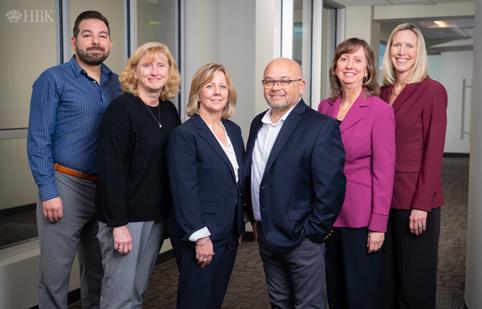
“Every company, regardless of size, deserves access to world-class HR expertise,” noted Robert Floreak, president of Acuity. “Exceptional HR practices drive productivity, efficiency, and effectiveness, helping organizations achieve financial and non-financial objectives.”


hbkcpa.com
HR is a vital business function, and as such, contributes directly to your bottom line by driving productivity, efficiency, and effectiveness. Advanced HR programs focusing on performance management, organizational optimization, business analytics, and incentive plan design make a meaningful difference to your income statement. Business-driven HR not only impacts your company today, it strategically transforms your future.
TAKE THE NEXT STEP: Discover how our proven HR strategies can accelerate your success. Contact us now to find out how HBK Talent & HR services can help you optimize your human resources potential.
For 45 years, Markham Norton Mosteller Wright & Co. P.A. has been a cornerstone of Southwest Florida’s business community, providing toptier accounting, tax, and consulting services. Based in Fort Myers and Naples, our firm has built a reputation for delivering tailored solutions to individuals, businesses, and organizations of all sizes.
Beyond traditional accounting and tax services, our team of experts specializes in areas like business consulting, construction, medical and dental practice consulting, non-profit services, forensic accounting and family mediation.
Let’s explore how we can help your business thrive—start a conversation with us today. Visit www.Markham-Norton.com or call (239) 433-5554






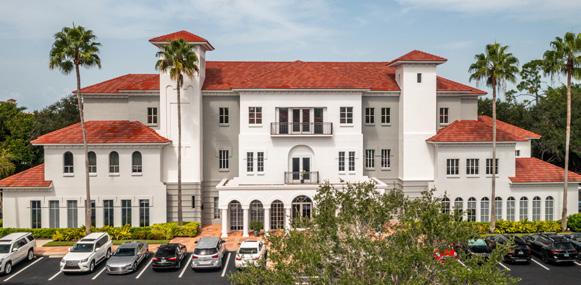
KOVA Companies operates as a fully integrated commercial real estate firm offering best in class brokerage, property and facilities management, investment, development, valuation and consulting services. Over our 35+ year evolution, KOVA Companies has leveraged a strong foundation by combining synergistic value-add business lines with knowledgeable and versatile professionals. Our mission is to be the preferred place to work, partner and innovate to create growth and value for our clients and stakeholders.
We aspire to be our local communities’ preferred provider of commercial real estate services. We strive to provide exceptional service, growth and value to our clients and stakeholders with an unwavering commitment to professionalism, integrity and industry knowledge.
In addition to its commercial enterprises, KOVA Companies established the KOVA Foundation as a local non-profit organization. KOVA Foundation is committed to uplifting lives in Southwest Florida by supporting families in our community. Through the Emma’s Wish initiative, the foundation brings hope and inspiration to patients and families navigating breast cancer.
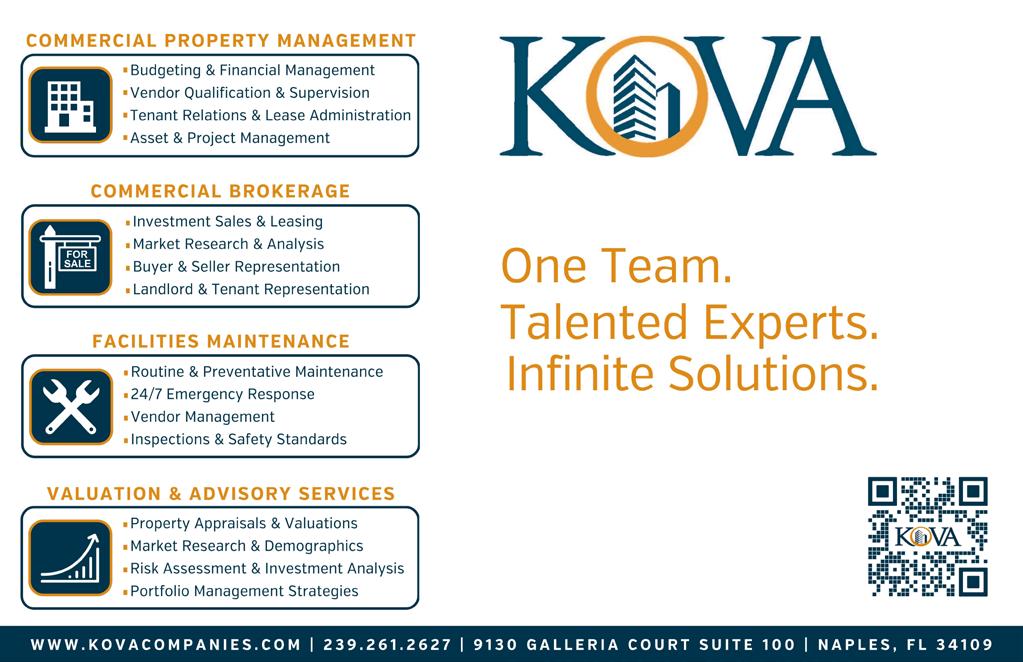
LSI Companies is the parent company of Land Solutions, LSI Commercial, and Development Solutions. By consolidating all aspects and efforts of commercial real estate acquisitions and dispositions, we deliver highly accurate data for the area’s largest homebuilders, developers, landowners, and investors. We specialize in the development, acquisition, and disposition of land and improved properties, with a strong focus on both vacant land and developed homesites and communities. We also offer services that include market research and reporting, permitting, zoning and entitlements, investor relations, legal support and closing coordination, and appraisals. In addition, the team has established relationships with the area’s finest engineering, surveying, environmental, and legal consultants, who can tackle any challenge. We have knowledge of the market and a well-established reputation in Southwest Florida, which provides our clients with the ability to capitalize on market information and make informed decisions.
239.489.4066
info@lsicompanies.com
LSICOMPANIES.COM


















A full service commercial real estate brokerage and advisory firm, Premier Commercial specializes in commercial leasing and sales, investment and income properties, project leasing, business brokerage and land acquisitions primarily on Florida’s west coast, with offices in Naples and Bonita Springs. The firm’s real estate professionals boast significant backgrounds in commercial real estate and strive to provide superlative service to their clients.
Premier Commercial is part of the renowned Lutgert family of companies, which has served Florida’s Gulf Coast communities for over 60 years. The elite team consists of Dougall McCorkle and associate Darren McCorkle of the Naples office as well as Broker Andrew DeSalvo, Commercial Advisor Matthew Stepan, CCIM, and Broker Associate W.T. Pearson of the Bonita Springs office. With unprecedented expertise, Premier Commercial is wellequipped to assist clients with all their commercial real estate needs.

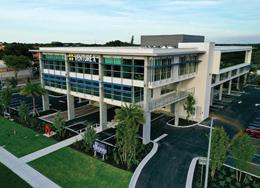


Group, Inc.
in Southwest Florida, AJS Realty Group leads real estate services that are tail ored to the unique
and authentic relationships.
experience in Southwest Florida, AJS Realty Group leads commercial real estate services that are tail
W ith over 30 years of experience in Southwest Florida, AJS Realty Group leads the way in offeri ng commercial real estate services that are tail ored to the unique
Property Management, Relations
Management, Relations
expertise and pe strategic connect ions, and authentic relationships.
pe rsonalized service through proactive connect ions, and authentic relationships.
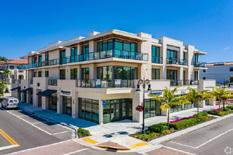
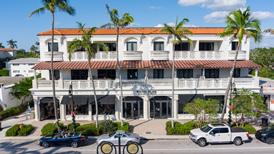


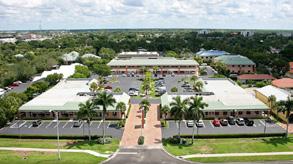


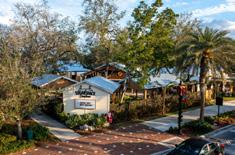


With over 30 years of experience in Southwest Florida, AJS Realty Group leads the way in offering commercial real estate services that are tailored to the unique needs of each client.

Sales, Leasing, Property Management, Consulting, Tenant Relations
We provide proven expertise and personalized service through proactive communications, strategic connections, and authentic relationships.


239.596.9500
AJSREALTYGROUP.COM










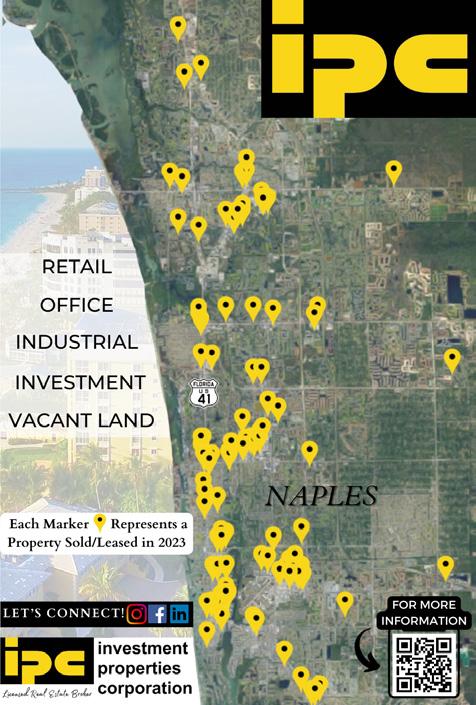


OUR APPROACH • COMPREHENSIVE & TEAM BASED
As Naples' first commercial real estate firm, Investment Properties Corporation has been serving SWFL with the highest level of commercial





estate services for nearly 50 years.
As Naples’ first commercial real estate firm, Investment Properties Corporation has been serving Southwest Florida with the highest level of commercial real estate services for nearly 50 years.
As Naples' first commercial real estate firm, Investment Properties Corporation has been serving SWFL with the highest level of commercial real estate services for nearly 50 years.
Specializing in buyer and seller representation, site selection, leasing, exchanges, consulting, and development services, the IPC team possesses a comprehensive knowledge of the Southwest Florida marketplace. IPC’s diligence, savvy market insights, and



Specializing in buyer and seller representation, site selection, leasing, exchanges, consulting, and development services, the IPC team possesses a comprehensive knowledge of the Southwest Florida
Specializing in buyer and seller representation, site selection, leasing, exchanges, consulting, and development services, the IPC team possesses a comprehensive knowledge of the Southwest Florida marketplace. IPC’s diligence, savvy market insights, and unrivaled service has earned and strengthened the confidence of our clients.




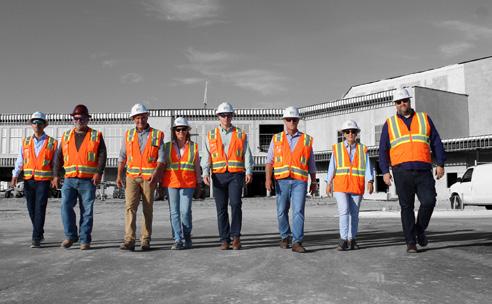
Since 1982, Owen-Ames-Kimball Co. has been shaping Southwest Florida with expert construction management services. We’ve served K-12 and higher education, aviation, healthcare, government, community/non-profit, faith based, and corporate/industrial sectors. With 95% of our work from repeat clients, our team earns your trust through lasting relationships. At O-A-K, we don’t just construct buildings - we build the future of our community together.



HORSEPOWER / WELLNESS / UNWIND / BACKSTORY

A striking, supersized EV pickup p_64
By James Raia
By James Raia
Take a $1 billion grant from the Pentagon and add an eager automaker’s creativity and the influence of Arnold Schwarzenegger. The result is the Hummer, a 33-year-old behemoth whose tumultuous tenure is as confounding as any vehicle in recent automotive history.
Slightly more than 40 years ago, AM General, a heavy vehicle manufacturer in Indiana, secured the funding and built the High Mobility Multipurpose Wheeled Vehicle (Humvee). It was the go-to cargo and troop transport vehicle in Middle Eastern military operations, and 72,000
were made in eight years.
Schwarzenegger was enamored with the Humvee used on the set of his 1990 movie Kindergarten Cop . He persuaded its maker to introduce a consumer version, which it did in 1992, renaming it Hummer.
EV options joined the Hummer lineup as a pickup in October 2020 and as a sport utility vehicle in April 2021. With its new status, everything the original Hummer (and its single-digit gas mileage and other extremes) represented is forgiven.
A precursor to the polarizing looks of the Tesla Cybertruck, the Hummer is


about as far removed from the automotive norm as feasible, and a wondrous contradiction. Through name and ownership changes, bankruptcies, production hiatuses and auto industry upheaval, the 2025 GMC Hummer EV Pickup is here in its refreshingly bold ways. It’s as overbearing as ever, a 9,000-pound, getout-of-my-way beast with 22-inch wheels and an omnipresent menacing appearance — its name couldn’t be emblazoned across the formerly attractive grille any more boldly — and it has a commanding road presence at more than 18 feet long. Of course, that means it doesn’t fit in standard-sized parking spaces; it’s also difficult to enter and exit.
Payload capacity is 1,300 pounds and the towing limit 7,500 pounds. The pickup has an 11.3-cubicfoot front trunk standard on both models that also stores the four removable
Acceleration: 0 to 60 mph, 3.3 seconds
Airbags: 4
Gas mileage: 381-mile range, 53 MPGe
Manufacturer’s Suggested Retail Price: $104,650
Price as reviewed: $119,280
Manufacturer’s website: gmc.com/electric/ hummer-ev/suv
Warranty: Bumper-to-Bumper, 3 years/36,000 miles; Powertrain, 3 years/36,000 miles; 8 years/100,000 miles electric engine components; Corrosion, 3 years/36,000 miles; Roadside Assistance, 5 years/60,000 miles
roof panels when needed. Standard also are front and rear pedestrian alerts, automatic braking and blindspot warnings.
The pickup has two trim levels, the 2X and 3X. The 2X, not surprisingly, has two electric motors — one each on the front and rear axle. It has a combined 570 horsepower. The 3X has three electric motors — one on the front axle, two on the rear — combining for 1,000 horsepower. Home charging via a 240V system takes 10.5 hours.
Wireless Apple CarPlay and Android Auto are easy to connect and function well, but the Hummer doesn’t have an onboard navigation system. The 14-speaker Bose sound

system is sometimes not the best since the Hummer has substantial wind noise issues. A hefty supply of USB outlets, 12-volt outlets and wireless charger are included. The rear row has a 120-volt outlet, and there’s also Google Assistant.
With its high perch seating and square windows, the Hummer has superior visibility, further assisted
by a surround-view camera system harnessing nine cameras with 19 available views.
There are shortcomings: The four-door, five-passenger crew cab has a condensed, five-foot bed. It’s smaller than the bed of its Honda Ridgeline lookalike. The Hummer also has a tiny, hard-to-reach rear-view mirror, which is particularly odd considering the vehi -
cle’s girth. Likewise, the side mirrors don’t correspond to the vehicle’s extra-large, rugged persona.
The 2025 GMC Hummer EV pickup, as reviewed, cost just under $120,000. The brand has never been inexpensive, but the 2025 edition is a value purchase for consumers who know what they want and buy it because they can.

The changing challenges of work-life balance
Maura Thomas is a writer, renowned international speaker and business trainer who specializes in individual and corporate productivity. The author of six business management books, she knows the intricacies of the work-life balance and workplace boundaries, and their changing definitions, as well as any authority.
The terms, used for decades, are the result of increasing challenges of business. Their extremes range from the idea of being “always on” to excessive meetings and constant workplace distractions to changing workplace boundaries. The issues can cause increased pressure, stress and burnout and affect businesses across industries.
“Instead of being a buzzword that is vague and open to interpretation, leaders need to provide for their team members a definition of work-life balance that is relevant to the current business environment,” says Thomas, who consults with companies nationwide. “Then this clarity can serve as a guidepost to employers and employees alike. It can be useful in crafting policies, attracting and keeping talent and, if adopted as a company value, can guide employee behavior at all
By James Raia
[levels]. Time away from work also allows the opportunity to engage in activities that stimulate creativity — travel, dining, conversation, books, movies, hobbies.”
Businesses in Southwest Florida aren’t immune to the changing landscape. Patrick (PJ) Bimonte, a member of the board of directors of the American Heart Association in Estero and a longtime business manager, agreed that the work-life environment has changed notably, particularly since COVID-19.
“As a leader, I personally think setting boundaries on work time is very important,” Bimonte says. “But I say, ‘I will not call you after work, but if I do it is going to be because it’s important.’ If everything is a No. 1 priority, nothing is a No. 1 priority. I think if you don’t do that, you lose your sense of the ability to prioritize.”
Thomas offers two common but limiting definitions of work-life balance. It’s the “convenience of being able to manage a personal life during the work day, without the hassle of having to get permission or explain our activities to others.”
Another common definition of work-life balance is “equal time or priority to personal and professional activities.”
The owner of Regain Your Time in Austin, Texas, Thomas says the definitions “have weaknesses that are preventing work-life balance from being the solution it should be.”
Better definitions in the changing work environment, particularly in the evolving hybrid work environment in the aftermath of COVID-19, are “work-life integration” and “work-life blending.” The terms, Thomas said, better define the combination of the freedom and convenience on the workplace. They also adequately describe the allocation of time to work vs. non-work.
“In our digital age, it’s all too easy to message employees outside business hours, or even when they’re on vacation,” she says. “And employees feel increasing pressure to respond to messages from the dinner table, the kids’ soccer game — even from bed in the middle of the night! These behaviors sound to me like ‘work-life integration,’ illustrating why this isn’t a useful term. They create a downward spiral in your culture and promote burnout.”
Thomas stressed three components critical to optimal knowledge work: physical well-being, emotional well-being and creativity. A work week of 38 to 45 hours is optimal.


In a post-COVID-19 world, the work-life environment has significantly changed with many working hybrid or remotely. This change in environment means a change in the definition of worklife balance to limit increased pressure, stress and burnout.


Daniel Berger, author of the recently released book The Quest: The Definitive Guide to Finding Belonging , prefers the term “work-life integration” to “work-life balance.”
The Boise, Idaho-based entrepreneur believes the latter doesn’t take into consideration that collectively the workforce spends about 25% of its time working.
“Work-life integration is more about how to integrate whatever you do into your life and vice-versa,” says Berger. “Especially into a post-COVID-19 world where people have their own schedules, usually working hybrid or remote.
“The first thing we have to talk about is the marriage between work and life, that’s the sort of refrain
that needs to take place. The second thing I think is that employers need to decide whether they want to have the kind of culture that everyone is always committed and always ‘on’ or a culture where they really respect boundaries between the individual and the workplace.”
Berger cited the recent ouster of Laxman Narasimhan, the former CEO of Starbucks, who also had tenures as CEO of PepsiCo and Reckitt and spent nearly 20 years in management at McKinsey & Company. Narasimhan was known for his work-life philosophy that included not working after 6 p.m.
The unique approach was embraced by many. But it was also viewed as not conducive to success,
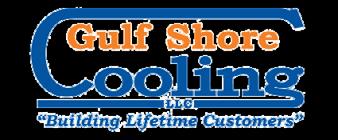

particularly for a brand of Starbucks’ global prominence.
“I don’t think the workplace is a place where we can find belonging,” Berger says. “But what I do think is that the workplace is a place where we can launch belonging. What I mean by that is that workplace is a place where we can meet friends. We can meet romantic partnerships. We can work together as teams and feel a sense of togetherness.
“But we can’t have those expectations, and if we do, we are really missing a sense of well-being in our own lives. In other words, we have to belong outside the workplace before we can think about belonging inside the workplace.”
AT TOP GOLF FORT MYERS 9:00 AM - 12:00 PM SATURDAY
February 1, 2025




By Artis Henderson
Jesse Itzler — author, entrepreneur, former rapper and current husband to Sara Blakely, founder of Spanx — has popularized the idea of the Misogi Challenge, which he defines as doing one hard thing every year. How hard? Hard enough to set the tone for the entire year.
For some people, this might mean running a marathon. For others, it’s launching a new business. Maybe it’s starting — and finishing — a book project. Or perhaps it’s making the leap to live abroad. Whatever the terms, it has to be enough to set this year apart from all the others.
There’s still plenty of time left in 2025 to take up the challenge.
The original Shinto practice of misogi refers to “water cleansing,” and it involves ritualized bathing under a waterfall in winter. The cold water purifies both the body and mind, which helps prepare the way for the months ahead.

Some of our favorite year-defining projects from around the world.
Climb Mount Kilimanjaro
Run the Miami Marathon
Get deep-water SCUBA certified in Key Largo
Write a book
Start a podcast
Visit a new country (our top picks for 2025: Belize, Peru and Montenegro)


If you need some inspiration to get started, we love Michael Easter’s The
Reclaim Your Wild, Happy, Healthy Self. In this deeply satisfying read, Easter invites visionaries and thought leaders to share their solutions for a happier, healthier life. Their answers have a common thread; in an overfed, underchallenged world, the key to better well-being consistently comes from a surprising source — discomfort. While we’re tackling challenges that make us uncomfortable, perhaps a little less control might be on the list. We’re digging How to Let Things Go: 99 Tips from a Zen Buddhist Monk to Relinquish Control and Free Yourself Up for What Matters. Written by bestselling Buddhist monk Shunmyo Masuno, How to Let Things Go offers practical and insightful tips for stepping away from social media, giving people space and setting clutter free.
The best part of a challenging new project is in the planning. Our advice with this one: Take your time. Pick a favorite spot, order a delectable cocktail and put pen to paper to map out your approach. We love the stunning bar at Angelina’s Ristorante in Bonita Springs for exactly this sort of thing. Softly lit with live piano music in the background, it’s the perfect place to map out a grand adventure.
Can’t carve out time to get away? Stay home instead. Light a few candles, put on gentle music and mix up your favorite cocktail. We love the Sweet Heat Espresso Martini from Angelina’s with its blend of chocolate and spice. To make your own version at home, combine:
1 oz Ghost Pepper Tequila
1 oz Licor 43
1 oz Ancho Chili Chocolate Liqueur
2 oz fresh-brewed espresso
Shake with ice and strain into a martini glass. Serve with a garnish of espresso beans and a dash of cinnamon and nutmeg.


Thomas Edison’s role in Southwest Florida’s history
By Justin Paprocki
On his doctor’s orders, Thomas Edison was looking to escape the cold weather of the Northeast when he came to Florida for the winter. In 1885, he purchased a plot of land along the Caloosahatchee for a vacation home. Fort Myers was a fledgling town at the time, and the annual arrival of the world-famous inventor and his wife Mina became a hotly anticipated and celebrated affair locally: The local newspaper printed his date of arrival and crowds would gather at the train station to meet him.
But Edison didn’t just come to Southwest Florida to relax; he became the town’s top advocate. The avid fisherman sang the praises of the region’s sport fishing, putting the town on the map as a top tourist destination. Soon, his wealthy and influential friends came to join him; Standard Oil magnate Ambrose McGregor and Henry Ford became neighbors. Ford, Edison and Harvey Firestone started the Edison Bo-
tanic Research Corporation on the property, finding ways to develop domestic sources of rubber. (Edison is pictured above with Firestone in their lab.)
In ways large and small, Thomas and Mina gave back to their winter home, including donations to start a volunteer fire department and library. They donated the royal palms that still shade McGregor Boulevard today.
One of his last acts in Fort Myers was to cut the ribbon to open the new Edison Bridge in 1931. He passed away later that year. In 1938, the Edison Pageant of Light was started to honor his achievements and influence in the town. Mina Edison continued to spend time in Fort Myers, staying involved in civic groups and focusing on beautification projects. In 1947, she donated the Edison Estate to the city. It’s now part of the Edison and Ford Winter Estates, a museum and botanical garden honoring the city’s most famous former resident.

For over 20 years, Sanibel Captiva Community Bank has pledged to support our customers, team members and community with the same passion and dedication we’ve had since the day we opened our doors. We may have grown to eight locations throughout Lee County with 125+ employees, but we're still that small, neighborhood island bank at heart. You can bank on it.




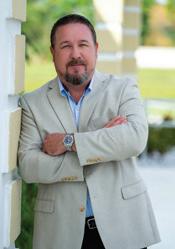

… deliver smart banking and lending solutions right for you and your business?
… recognize the value of establishing relationships with their customers?
… continuously support and contribute to local organizations ($5+ million donated since 2003)?
… average 1,000 volunteer hours annually?





